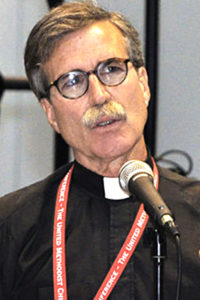The Missing Ingredient
We must no longer be children, tossed to and fro and blown about by every wind of doctrine, by people’s trickery, by their craftiness in deceitful scheming. But speaking the truth in love, we must grow up in every way into him who is the head, into Christ. . . . (Ephesians 4:14-15, NRSV)
During the summer of 1979, my wife and I moved to Princeton—New Jersey, not North Carolina. After we arrived, I enrolled in a summer-school course at Princeton Theological Seminary. As I recall, the class started at 9 am and concluded at noon for fifteen consecutive working days. Afternoons and evenings were for reading books and writing papers. Was this a theological boot camp?
Richard John Neuhaus, a Lutheran pastor from New York City, taught the course I was taking, titled “The Theory and Praxis of the Christian Ministry.” He had just published Freedom for Ministry (Harper & Row, 1979, Eerdmans, 1992), which was the starting point for the class. Over the next three weeks, Neuhaus persuaded his students, in their pastoral ministries, to take up St. Paul’s challenge to the Ephesian clergy and laity: to always “[speak] the truth in love.”
In the following years, Neuhaus often recalled Dr. Martin Luther King’s statement: “Whom you would change, you must first love; and they must know that you love them.” King’s change-and-love challenge seemed consistent with Paul’s truth-and-love challenge.
Some years before becoming Pope Benedict XVI, Joseph Ratzinger, then head of the Vatican’s Congregation for the Doctrine of the Faith, declared that “only what is true can ultimately be pastoral.” With these words, Cardinal Ratzinger was apparently attempting to rescue pastoral ministry from the soft, but dangerous, clutches of sentimentality.
Because of Neuhaus’s teaching, reinforced by King and Ratzinger, this pastor aspired, sometimes successfully, to speak the truth in love. “Truth and love” became a mantra for my ministry. Not surprisingly, just before retiring from parish ministry, I preached a sermon titled “Truth and Love” to many of the graduating seniors of Whiteville High School (and their families) in southeastern North Carolina.
Aspiring to serve the truth in love has helped guide me in preaching and teaching the Gospel of Life. At times, it has saved me from propagating falsehoods in the name of keeping a perverse kind of peace. At other times, it has delivered me from despising those who resist this teaching, keeping me from giving them another reason for saying Heck no! to the Gospel of Life.
Recently, it has seemed that the ministerial mantra of truth and love might be missing something. Namely, courage. Without courage to serve the truth in love, such service will be avoided. With courage, service of the truth in love can and will begin—even when the resisters are resisting.
Americans live in a society—and many of us in churches—where more than a few are cruising around online in search of offensive statements so that they can attack the offenders and, finally, cancel them. It’s no wonder that these days people who serve the Gospel of Life are hesitant to say a word about protecting the unborn child, the disabled, the chronically ill, and the dying. We know the truth of God’s gift of life to (and divine image in) every person—without exception. And we can love even those who disagree with and war against us. But cancel culture makes us think twice about speaking or writing in love the Gospel truth about defenseless human life. Courage is needed to face the music that follows our witness.
From where does such courage come? From God in Jesus Christ in the power of the Holy Spirit. From Jesus Christ presenting Himself to us in Holy Communion. From God’s Word addressing us through sermon and page. From praying—especially the prayers written by those who have gone before us. From knowing the virtuous lives of the exemplary saints of the Church—from Augustine to Calvin to Teresa to Bonhoeffer. From frequent fellowship that encourages accountability to Christ’s commands. From close encounters with our enemies. Courage most certainly will arise from participation in these Christian practices.
So, do you have a modicum of truth about the Gospel of Life, and love for those who trust (and for those who distrust) it, and the courage to propose that Gospel? If so, you are ready. Do not delay. Do not hesitate. You can, and should, speak and witness and act for the Gospel of Life. And with God’s help, you will. With truth, love, and courage, you can speak and work to protect the unborn (and their mothers and fathers), the bed-ridden, the chronically ill, the hopeless.
On the way to the task, do not forget the courage. In today’s cancel culture, courage is required. “For our struggle is not against enemies of blood and flesh, but against the rulers, against the authorities, against the cosmic powers of this present darkness, against the spiritual forces of evil in the heavenly places. Therefore take up the whole armor of God, so that you may be able to withstand on that evil day, and having done everything, to stand firm.” (Ephesians 6:12-13, NRSV)










